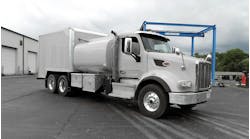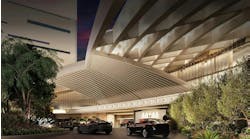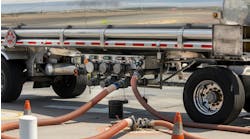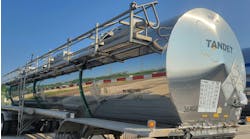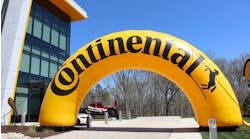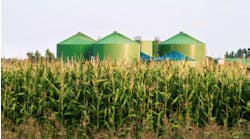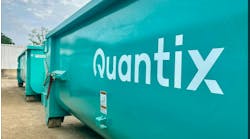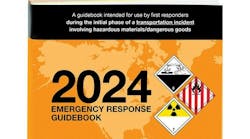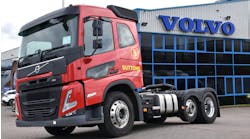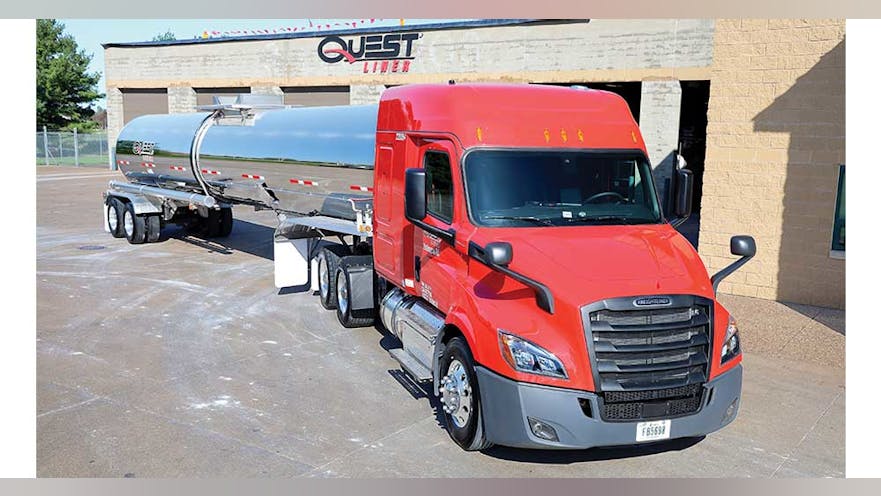WITH the recent acquisition of an Ohio-based dry bulk carrier, Quest Liner Inc has made the statement that it wants a bigger share of plastics hauling in North America. It’s part of an overall growth strategy for the tank truck carrier.
Quest Liner purchased Schindewolf Express and Warehousing earlier this year. Based in De Graff and Quincy, Ohio, Schindewolf served the bulk plastic resins market for the past 27 years. With operations in 17 states and Canada, the dry bulk hauler boasted a long-standing alliance with suppliers to the US automotive industry servicing several manufacturing locations.
This acquisition joins a vigorous plastics hauling operation Quest Liner developed in Mexico over the past four years. Based in Monterrey, Nuevo Leon, the Mexico operation includes, packaging, warehousing and rail-to-truck transload capabilities.
“Our current plan is to significantly increase the percentage of plastics volume that we handle across North America,” says Carl Recher, Quest Liner executive vice-president & chief operating officer. “We believe it is a very good business to invest in as part of our growth strategy. We want Quest Liner to be a leading carrier in the plastics sector in addition to our presence in the liquid specialty chemical transportation space.
“At the same time, we will continue to look for growth opportunities—both internal and external—on the liquid bulk specialty chemicals side of our business. Our vision is to see Quest Liner become at least as large as sister company Foodliner Inc. However, the strategy is to increase our scope while maintaining the premium service levels to our customers that have allowed the company to be successful.”
McCoy Group
Quest Liner and Foodliner are subsidiaries of Dubuque, Iowa-based McCoy Group. The two carriers reported combined gross revenues of roughly $317 million for 2018 serving customers across North America.
In addition to the two tank truck carriers, McCoy Group subsidiaries include Truck Country/Stoops Freightliner-Quality Trailer; McCoy Nationalease, and McCoy Construction & Forestry.
Quest Liner focuses on non-foodgrade and industrial cargoes, while Foodliner is a liquid and dry bulk foodgrade specialist. “Without exception, no Foodliner trailer hauls chemicals, and no Quest Liner trailer hauls food,” says Jeff Wesenberg, executive vice-president & chief operating officer of Foodliner and Quest Liner.
During the 60th anniversary of the McCoy Group last year, McCoy Group President Greg McCoy told Bulk Transporter magazine that he believed Quest Liner could grow to be a $200-million-plus carrier in its own right.
Fleet launch
Quest Liner was launched in 2007 when the McCoy Group acquired Gless Brothers Inc in Blue Grass, Iowa. The initial focus was on beverage and denatured alcohol, and the fleet operated out of terminals in Blue Grass and Washington, Indiana. Fleet size was approximately 100 trucks.
In 2012, Quest Liner began expanding into specialty chemicals. Today, the carrier hauls roughly 2,400 different specialty chemical products, about 90% of which are placarded as hazardous materials.
Quest Liner currently runs 310 tractors and 490 liquid and dry bulk trailers. Owner-operator tractors account for about 40% of the power units in the fleet.
Operations are conducted from nine terminals in the eastern half of the United States. In addition to the original two locations, Quest Liner has terminals in Ottumwa and Waterloo, Iowa; Joliet, Illinois; Houston, Texas; Tuscaloosa, Alabama; Tampa, Florida; and DeGraff, Ohio.
Wash racks
Company wash racks operate in Blue Grass; Washington, Indiana; Quincy, Ohio; and Tuscaloosa. “We clean about 120 tank trailers a week at the Blue Grass facility, and that includes chemical and foodgrade cleaning,” Wesenberg says. “Quest Liner trailers are only cleaned at chemical wash racks. Third-party wash racks used by Quest Liner include Express Container Service and Quala.
“Foodliner tanks are cleaned at dedicated foodgrade wash bays at the Blue Grass location. Maintenance facilities across the entire Quest Liner and Foodliner system serve both fleets.”
With its focus on plastics hauling, the DeGraff terminal includes a 50,000-sq-ft warehouse and a rail siding with seven railcar spots. “Our DeGraff location can transload plastics from railcars directly into pneumatic bulk trailers for shipment to customers or to the warehouse,” Wesenberg says.
In Mexico, Quest Liner has partnered with Transportes Monro in what Recher calls an enhanced logistics operation for plastics storage and distribution. Quest Liner operates a 150,000-sq-ft warehouse that includes bagging capabilities. A large rail siding includes 100 railcar spots.
“Transportes Monro, our carrier partner in Mexico, hauls dry and liquid bulk cargoes for us,” Recher says. “We have rail connections with Kansas City Southern and FerroMex. For dry bulk, we operate 35 aluminum pneumatic trailers with 1,650-cubic-foot capacity that were built by Retesa. Plastic pellets account for most of the dry bulk activity, but we also haul some starch.”
Fleet management
System wide, fleet operations are managed with Trimble’s TMW technology, PeopleNet on-board computers, and SkyBitz trailer tracking. All dispatching is handled locally at the terminals where trucks are based but dispatchers and managers work together to coordinate activity across the Quest Liner system.
Quest Liner provides customers with regional and long-haul capabilities, and the average length of haul is 700 miles. “We give customers the service they need,” Recher says. “They know they can bring us business, and we will get it done. They know they will get a high level of service from Quest Liner.”
At the same time, drivers working for Quest Liner know that the carrier offers the range of business activity that can make just about any driver happy. “Most of our drivers are home twice a week, but those who want to stay out for long periods are welcome to do so,” Recher says. “We will keep them moving.”
He adds that owner-operators have an opportunity to move back and forth between Quest Liner and Foodliner. Such arrangements help ensure more driver stability across the system.
Driver retention is a critical factor, but it’s just part of the employee focus across the entire McCoy Group. “People are the reason Quest Liner and the other McCoy Group companies have succeeded,” McCoy says. “We find people who fit the chemistry of this company. All of them are solid, hard-working loyal individuals.”
Basic requirements for drivers include a minimum age of 22, a commercial driver license, and at least two years of tractor-trailer driving experience or one year of driving plus certification of completion from a truck driving school.
Driving schools
Quest Liner has developed relationships with six truck-driving schools to engage the top-ranked students in potential driving careers.
For students selected by Quest Liner, the schools provide an additional 80 hours of training specifically tailored to the tank truck carrier, according to Jon Stenzel, Foodliner and Quest Liner director of training.
After completing the driving school program, new teammates receive additional training with Quest Liner trainers. Quest Liner has seven driver trainers spread across its operation, and more than 40 trainers are available across the Foodliner system
For drivers who will handle chemical cargoes, training is tailored specifically to the drivers’ skill level. In all, the initial training takes about four weeks.
For experienced truck drivers, orientation and training take place at the terminal where they will be based. The orientation is held on Monday, followed by hands-on instruction Tuesday through Friday.
Safety focus
Safety is stressed throughout the initial training. Drivers attend quarterly safety meetings and participate in regular online training. “We’re achieving a 90% engagement factor with the online training,” says Michael T Birkett, Quest Liner executive vice-president of Safety & Human Resources. “We’ve rolled out a smart app with it that was well-received.”
Safety is something the Quest Liner management team takes very seriously, and fleet tractors are packed with some of the latest safety technology. This includes Wabco collision warning, adaptive cruise control, lane departure warning, and roll stability. The carrier is in the process of analyzing and testing on-board video camera systems.
The newest tractors are Freightliner Cascadias with 450-horsepower Detroit DD13 engines and Detroit DT12 automated transmissions. “We believe automatic transmissions are playing a bigger role in driver hiring and retention,” says Kyle Neumann, Quest Liner maintenance director.
New tractors and trailers are fitted with aluminum wheels and widebase Michelin tires. “The tires perform well and they lower vehicle tare weight,” Neumann says.
Product handling equipment on the tractors includes the Gardner Denver MH3 hydraulic power system and Muncie PTO. Tractors in dry bulk service also carry a Gardner Denver blower.
Quest Liner has begun offering Paragon’s HydraCHEM modular product pump and compressor system to owner-operators. The Hydrachem unit offers easy installation behind the tractor cab.
The newest Polar DOT407 stainless steel chemical trailers have a 7,200-gallon capacity and a 300° F temperature rating. Tank hardware includes Betts domelids, pressure-relief valves, and discharge outlets. Viking stainless steel product pumps are mounted in a cabinet at the rear of the trailer.
